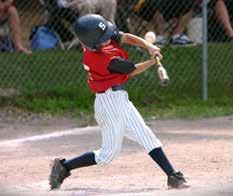
3 minute read
Pre-participation physical examinations
As a parent, you want to keep
your children safe on and off the field. There are many steps we take to prepare our children for the season, but the first step is to make sure they are physically ready and able to participate. Many youth leagues do not require a physical exam for participation, but most strongly recommend them to keep your child safe and playing to the best of their potential.
According to the American College of Sports Medicine, the purpose of a physical examination is to provide the schools and organizations that your child plays for with all information pertaining to your child’s health and wellbeing. The goal of the exam is to identify any medical or orthopedic problems as well as any correctable problems which may impair performance, and assess your child’s fitness level pertaining to their sports. If any problems are identified, then your child can be referred to the correct specialist to resolve these issues before their season begins.
The Pennsylvania Interscholastic Athletic Association (PIAA) requires that, starting with middle school sports, student athletes who would like to participate in PIAA sanctioned sports must have a completed Comprehensive Initial Pre-participation Physical Examination (CIPPE) before the official start date of their sport. This examination must be done by an authorized medical examiner and be completed no earlier than June 1 of the academic year. The exam will remain valid through May 31 of the following year.
The CIPPE form may seem like a very long and tedious process, but taking the time to read and fill out each section with your child is an important step in ensuring their safety and well-being when it comes time to play. These forms will cover everything from general demographic information to past and present medical history. It is important to read each section carefully in order to answer to the best of your ability.
The exam consists of both a medical and orthopedic section. The medical section will assess your child’s vitals as well as a review of their internal systems, including cardiovascular. The physician will check your child’s heart to identify if they may be at a higher risk for cardiac issues. A large part of
the medical exam is dedicated to reviewing your child’s medical history. Adequate time and consideration should be taken when filling in the medical history section (Section 6) of the PIAA CIPPE, as this is one of the most important pieces of information for the exam. This will cover not only your child’s medical history, but also your immediate family history, which is very important and relevant in regards to your child’s health. Presence of an illness within your child’s immediate family may predispose your child to the same condition. When filling in this section, make sure to provide an explanation for the questions to which you answer yes. It is also important that your child understands what is on this form, especially if you are not going to be with them for the examination.
The orthopedic section of the exam will allow the physician to examine the musculoskeletal system in regards to your child’s ability to perform in their sport. Any previous injuries, or if you child is currently being treated for injury, should be disclosed on the history section of the exam. Muscular range of motion and strength, as well as the neurological system, will be assessed. This exam may result in your child needing to follow up with an orthopedic specialist to identify and / or correct any musculoskeletal deficits.
The other sections of the CIPPE include signatures of both the parents and students acknowledging the responsibilities and risks of athletics. New sections have been included over the past few to years to explain the importance of concussion awareness, cardiovascular health in athletics with the addition of Peyton’s Law in Pennsylvania, and CoVid 19 awareness and information. There is also a section dedicated to athletes who wrestle and guidelines in regards to minimum weight classes.
As a parent or guardian of a young athlete, take the time to use the Comprehensive Pre- Participation Physical Examination as an opportunity to help your athlete excel on the field. The goal is not to disqualify your child from participation, but to protect them when they are out there on the field of play and allow them to succeed to the best of their ability.
Karen Richards, LAT, ATC
Senior Athletic Trainer Allegheny Health Network North Catholic High School








